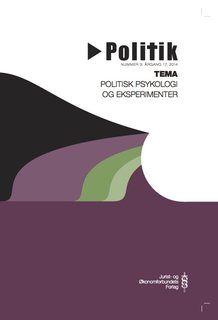Experimental Methods in Psychology and Cognitive and Affective Neuroscience
DOI:
https://doi.org/10.7146/politik.v17i3.27585Resumé
Laboratory experiments have always been important in psychology and are as commonly used today as ever due to the dominating position of cognitive research in international psychology. is trend has been fur- ther strengthened by recent developments in cognitive neuroscience, where experimental studies are central. Recently, experimental studies within the eld of a ective neuroscience have also received attention. Not- withstanding, experimental methods remain controversial also in psychology, and one should carefully weigh their advantages against their drawbacks. is article provides an introduction to experimental psychology, including basic principles and illustrative examples. e article focuses on the experimental method in its purest form, the controlled laboratory study, and discusses the value of this scienti c approach with regard to ecological validity and socio-cultural factors. Furthermore, the article describes the use of experiments within cognitive and a ective neuroscience as well as the inherent challenges of individual versus social perspectives when conducting micro level laboratory experiments.
Downloads
Publiceret
Citation/Eksport
Nummer
Sektion
Licens
Forfattere, der publicerer deres værker via dette tidsskrift, accepterer følgende vilkår:
- Forfattere bevarer deres ophavsret og giver tidsskriftet ret til første publicering, samtidigt med at værket er omfattet af en Creative Commons Attribution-licens, der giver andre ret til at dele værket med en anerkendelse af værkets forfatter og første publicering i nærværende tidsskrift.
- Forfattere kan indgå flere separate kontraktlige aftaler om ikke-eksklusiv distribution af tidsskriftets publicerede version af værket (f.eks. sende det til et institutionslager eller udgive det i en bog), med en anerkendelse af værkets første publicering i nærværende tidsskrift.
- Forfattere har ret til og opfordres til at publicere deres værker online (f.eks. i institutionslagre eller på deres websted) forud for og under manuskriptprocessen, da dette kan føre til produktive udvekslinger, samt tidligere og større citater fra publicerede værker (se The Effect of Open Access).

